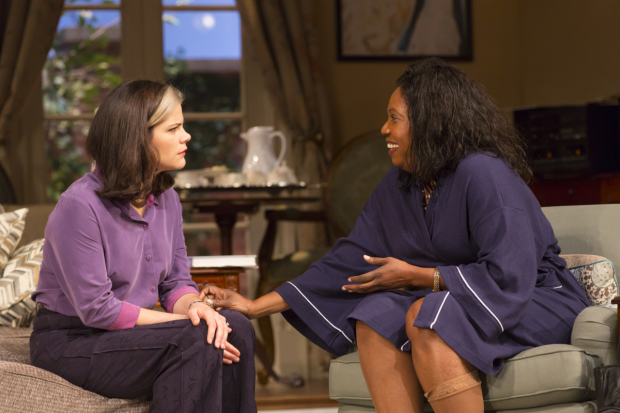An American Daughter

(© T. Charles Erickson)
While An American Daughter might not have been Wendy Wasserstein's most lauded play when it debuted in 1997, it has certainly proven to be her most prescient. Now that the "feminist" label has lost some of the acerbic bite it had while illusions of a post-gender society saturated the first Clinton era, Wasserstein's underappreciated work — guided by the light-handed direction of Evan Cabnet at Williamstown Theatre Festival — may find a more receptive ear on what could be the eve of the second.
As Wasserstein did in her earlier plays, she looks into the life of a woman trying to "have it all" — this time in the heart of American politics and partisanship. Diane Davis leads the way as Dr. Lyssa Dent Hughes, a successful physician living in Washington, D.C. with her semi-famous sociology professor husband Walter (Stephen Kunken, displaying the subtle unrest of a man in midlife crisis) and their twin boys. They're a well-off family, living in a beautiful colonial home (designed by Derek McLane) with a portrait of Ulysses D. Grant hanging on the wall to remind Lyssa of her presidential lineage (she is a fifth-generation granddaughter of the 18th president).
Still, Lyssa lives the prototypical life of a working mother (though perhaps on a loftier scale than most), advocating for women's health issues by day and picking up after her children by night…and day. Her tireless crusade to prove that women can in fact do it all has finally led her to the pinnacle of her career — a nomination for Surgeon General of the United States. However, after what was supposed to be a puff piece conducted by war correspondent Timber Tucker (Jason Danieley, delivering an understated arrogance with television-worthy slickness) uncovers a conveniently misplaced jury notice and Lyssa's mild disdain for stay-at-home mothers who make ice-box cakes, her nomination becomes a matter of national protest.
Suddenly, the liberal Dr. Hughes is too cold, too elitist, and too out of touch with the women of America to advocate for their medical rights. Simultaneously, every corner of the political spectrum has claimed the right to comment: There's Morrow McCarthy (an irreverent Roe Hartrampf), Lyssa's homosexual conservative friend who accidentally incited "jury-gate" and now tries to clean up his mess — and then there's Quincy Quince (a commanding performance by Kerry Bishé), a leggy blonde neo-feminist and Walter's former student who has built her young career on criticizing the lack of foresight among the 1960s bra burners. "This generation never examined consequences," she says. "Late marriages, infertility, even midlife career crisis, are all symptoms of their naivete." It's an infuriating perspective, but one Wasserstein won't let us dismiss so quickly as Lyssa's oldest friend and fellow doctor Judith Kaufman (Saidah Arrika Ekulona) mourns her lack of family while enjoying a thriving career. As an African-American Jew, Ekulona playfully blends the two dramatic cultures to reenact both a hilarious and heartbreaking performance of Tashlich — the Jewish "Festival of Regrets."
When Wasserstein penned An American Daughter, then-First Lady Hillary Clinton had already taken her jab at the country's cookie-baking moms — the essence of which surely became a part of Lyssa's character. But Wasserstein herself would probably be shocked to see how closely her play foreshadowed events 20 years in the making. Aside from the distinctly '90s powder-blue headband Dr. Hughes dons for what she hopes will be the interview to soften her public image (costume designer Jessica Pabst pairs that with a matching skirt suit), there is not even a whiff of age on the play (one of the biggest grievances with last year's Broadway revival of the Pulitzer-winning Heidi Chronicles, which was criticized as "dated"). Davis comfortably balances Lyssa's sharp intellect with her desire to compromise to get ahead, but her best performance comes during Wasserstein's glorious eleven-o'clock monologue where Lyssa's mouth overtakes her pragmatism.
Perhaps the only "American Daughter" in the play to have it all figured out is "Chubby" (a perfectly offbeat performance by Deborah Rush), the latest wife of Lyssa's Republican Senator father (a stately Richard Poe). Done up with bleach-blonde hair, perfect makeup, and a suit that would have made Nancy Reagan proud, she sits idly by like obedient arm-candy-only to crush an entire room of political professionals in a game of acronym trivia. For An American Daughter's first audiences in 1997 who considered themselves citizens of a gender-neutral society, this Chubby-Lyssa dichotomy could have easily seemed overwrought, and surely outmoded in a time of such liberal progressiveness. I suppose sometimes it just takes 20 years to gain perspective on the present.










